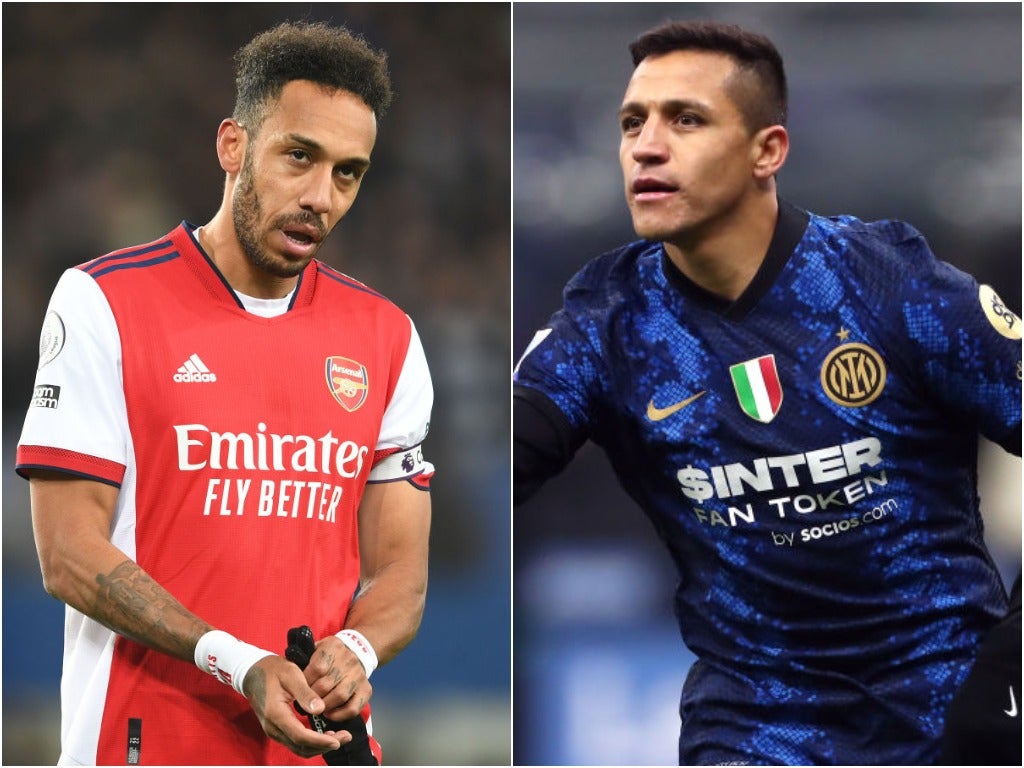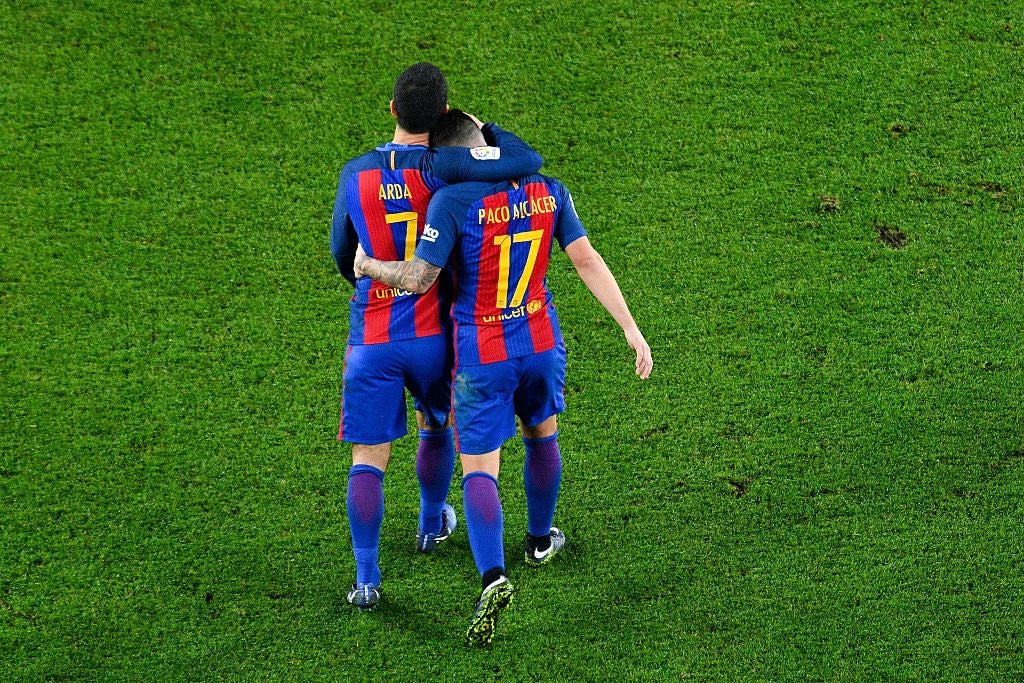Striker search paints story of Barcelona decline after seven years of transfer failures
Hundres of millions wasted on players who didn’t fit, weren’t given a chance or couldn’t make the grade

Your support helps us to tell the story
From reproductive rights to climate change to Big Tech, The Independent is on the ground when the story is developing. Whether it's investigating the financials of Elon Musk's pro-Trump PAC or producing our latest documentary, 'The A Word', which shines a light on the American women fighting for reproductive rights, we know how important it is to parse out the facts from the messaging.
At such a critical moment in US history, we need reporters on the ground. Your donation allows us to keep sending journalists to speak to both sides of the story.
The Independent is trusted by Americans across the entire political spectrum. And unlike many other quality news outlets, we choose not to lock Americans out of our reporting and analysis with paywalls. We believe quality journalism should be available to everyone, paid for by those who can afford it.
Your support makes all the difference.The deal hadn’t even been signed yet, when the local media (and no shortage of fans) were in uproar over Barcelona bringing in Luuk de Jong in the summer. He had neither the player profile, nor the reputation, of a typical signing for the Catalan club - much less a forward signing for them - yet he was available, affordable and reportedly a personal request of Ronald Koeman.
It was quite evidently a transfer which had far more to do with club politics and economic instability than sporting success - but that move, and the names they are now linked with in the same area of the pitch, only serve to show just how far the club has fallen and how much damage has been done.
Aside from being used as a temporary peacemaker between boardroom and dugout, there was rarely any chance of De Jong being a successful addition, little of which had anything to do with his own ability.
Quite simply, he came to the club in the worst period in memory for Barcelona, a summer when the scope of their financial ruin was laid bare for the world to see, when the scale of their drop-off from the elite had become abundantly clear and when their best player, the world’s best player again this year, departed on a shock free transfer.
The Dutch striker never had a chance. And so, around a day after the transfer window shut, rumours immediately began: Barcelona’s search for a new forward was on again, with a January move a certainty. Those same rumours have been incessant since then; oh, the names have changed, as well as the price tags, but the central theme under both Koeman and now Xavi has been that the forward line needs a boost.
In itself, it’s no surprise. After the emotional retirement of Sergio Aguero in midweek, the final third equation for this season reads Messi, Antoine Griezmann and Francisco Trincao out, only Memphis Depay and De Jong in. Unless the more high profile of the two Dutchmen immediately hit the greatest heights of his career, it was always going to result in an imbalance with the side worse off.
The issue now is that there’s no great reason to assume the next addition will be any better than previous attempts to improve the attack.
It’s approaching eight years since Barcelona signed a forward who could be labelled an absolute success.
That was the arrival of Luis Suarez in 2014, with a gargantuan sinkhole opening thereafter to swallow up inflated transfer fees and unsustainable wages on those who followed, in almost every position. It can in fact be argued that in the seven full seasons since then, the Camp Nou club has not actually had a single successful transfer window.
The best of them was probably 19/20, when an outlay of over £270 million saw Pedri and Frenkie de Jong arrive, both successes to different levels so far and with much more to come, but they also added Griezmann (£107m) who never hit the heights he was capable of, Neto (£25m) as a backup goalkeeper and Junior Firpo (£19m) who was sold at a loss.
If that was the best, there’s much more competition for the title of worst.
Waste piled upon waste notably included around £90m on the already-departed trio of Malcom, Arthur and Arturo Vidal in the same window, plus a combined £270m or so on Philippe Coutinho and Ousmane Dembele the campaign prior. Both those two remain; neither have been anything like successes. Both remain tipped to leave. Outrageous sums were at least accounted for, if not technically spent, on Miralem Pjanic, Paulinho, Andre Gomes.
Messi’s enormous salary was in the focus for much of the summer when it became apparent Barcelona couldn’t even register their new free transfer signings, so high was their level of debt and wage bill, but at least he offered value. He offered quality. Very few of the most expensive additions who have signed since Suarez can say the same.
Signed for the front three since then is a roll-call of fill-ins, flops and failures: Arda Turan, Paco Alcacer, Dembele, Malcom, Kevin-Prince Boateng, Martin Braithwaite, Griezmann, Trincao.

None have made the grade. None filled the void left by Neymar, then Suarez, now Messi.
A significant portion of the blame for the mismanagement must fall on the shoulders of Eric Abidal, director of football between 2018 and 2020, a short period which covered around £400m worth of deals alone.
Now, Jordi Cruyff is back at the club in the role of international director, Mateu Alemany holds the director of football position, former Barca player Jose Mari Bakero is the chief domestic scout and their old playmaker Deco oversees scouting in Brazil and Portugal. Between them, and perhaps with input from Xavi, they simply must do better.
Basel’s Arthur Cabral, Arsenal’s Pierre-Emerick Aubameyang and Inter Milan’s Alexis Sanchez are the current rumours - low-cost or out-of-favour players, way outside the elite. LFP president Javier Tebas claims there’s no way they can afford to sign Erling Haaland, for example.
The Ferran Torres reported interest quickly faded or, more probable, is simply unfeasible because he’d have a significant price tag. Sport still say he’s the top target, but it comes with heavy caveats such as needing to renew big contracts for less money or sell players.
Barcelona cannot afford to pay. But as a Champions League group stage exit and eighth place in LaLiga’s table attests to, they also cannot afford to get yet another striker signing badly wrong.
Join our commenting forum
Join thought-provoking conversations, follow other Independent readers and see their replies
Comments